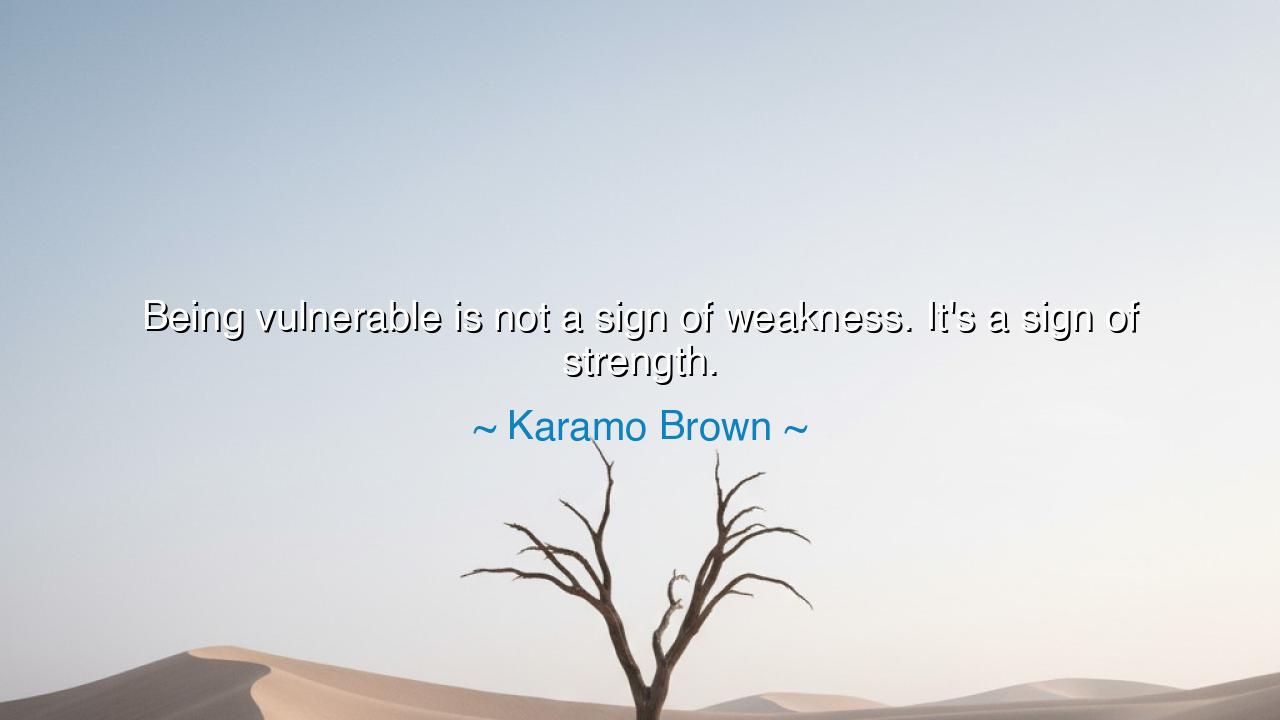
Being vulnerable is not a sign of weakness. It's a sign of






Karamo Brown’s words, “Being vulnerable is not a sign of weakness. It’s a sign of strength,” are spoken with the weight of a timeless paradox. He reminds us that the world often mistakes openness for fragility, and tears for failure. Yet in truth, to bare one’s heart, to admit pain, fear, or longing, requires a courage far greater than the armor of pride. Vulnerability is not the breaking of the spirit—it is the triumph of honesty over pretense, and the victory of authenticity over fear.
The origin of this wisdom arises from Brown’s work as a counselor and guide, one who has walked with others through their wounds and struggles. He learned, as healers throughout the ages have learned, that the greatest transformation begins not when we hide, but when we open ourselves to be seen. The ancient heroes may have wielded swords and shields, but the truest warriors have always been those who dared to expose their wounds and still press onward. Strength lies not in denial, but in the ability to stand unveiled and endure.
History gives us proof of this truth. Consider Abraham Lincoln, who battled melancholy throughout his life. He did not hide his sorrow, but allowed it to deepen his empathy and fuel his determination to lead a divided nation. His vulnerability did not weaken his leadership; it gave him the humanity to guide others with compassion. Because he dared to carry his inner pain openly, he became stronger than those who hid behind bravado.
We see the same in the story of Nelson Mandela, who, after decades of imprisonment, emerged not with vengeance but with forgiveness. His vulnerability—the willingness to show mercy to those who had crushed him—was not weakness. It was strength of the highest order, for only a powerful soul can bear injustice and yet choose reconciliation. Through this vulnerability, he healed not only himself, but a nation.
Karamo’s words also shine as counsel to everyday lives. Too often we are taught to hide our tears, to bury our fears, to pretend we are unbreakable. Yet this creates only isolation and distance. When we dare to be vulnerable, we invite others into our lives, and in that communion, we discover a deeper, shared strength. It is in admitting we need help that we gain allies; it is in confessing our struggles that we find support; it is in opening our hearts that we find love.
The lesson for those who listen is clear: do not mistake silence for strength, nor walls for power. True courage is the ability to say, “I am not unshakable, but I am still here.” To be vulnerable is to declare that life has wounded you, yet you still stand, still love, still hope. Such honesty is more heroic than any mask of perfection.
Practically, this means choosing openness where the world demands disguise. Speak honestly to your loved ones. Share your fears with a trusted friend. Allow your humanity to be seen. In doing so, you will not only free yourself from the prison of isolation, but you will also give others the courage to reveal themselves. Vulnerability spreads like a flame, and in its light, communities grow strong.
Thus let this truth be passed down: vulnerability is not weakness, but the purest form of strength. It is the strength that binds hearts, that heals wounds, that forges trust, and that endures even the darkest of trials. To be vulnerable is to be brave. To be vulnerable is to be fully human. And to be fully human is the greatest strength of all.






AAdministratorAdministrator
Welcome, honored guests. Please leave a comment, we will respond soon